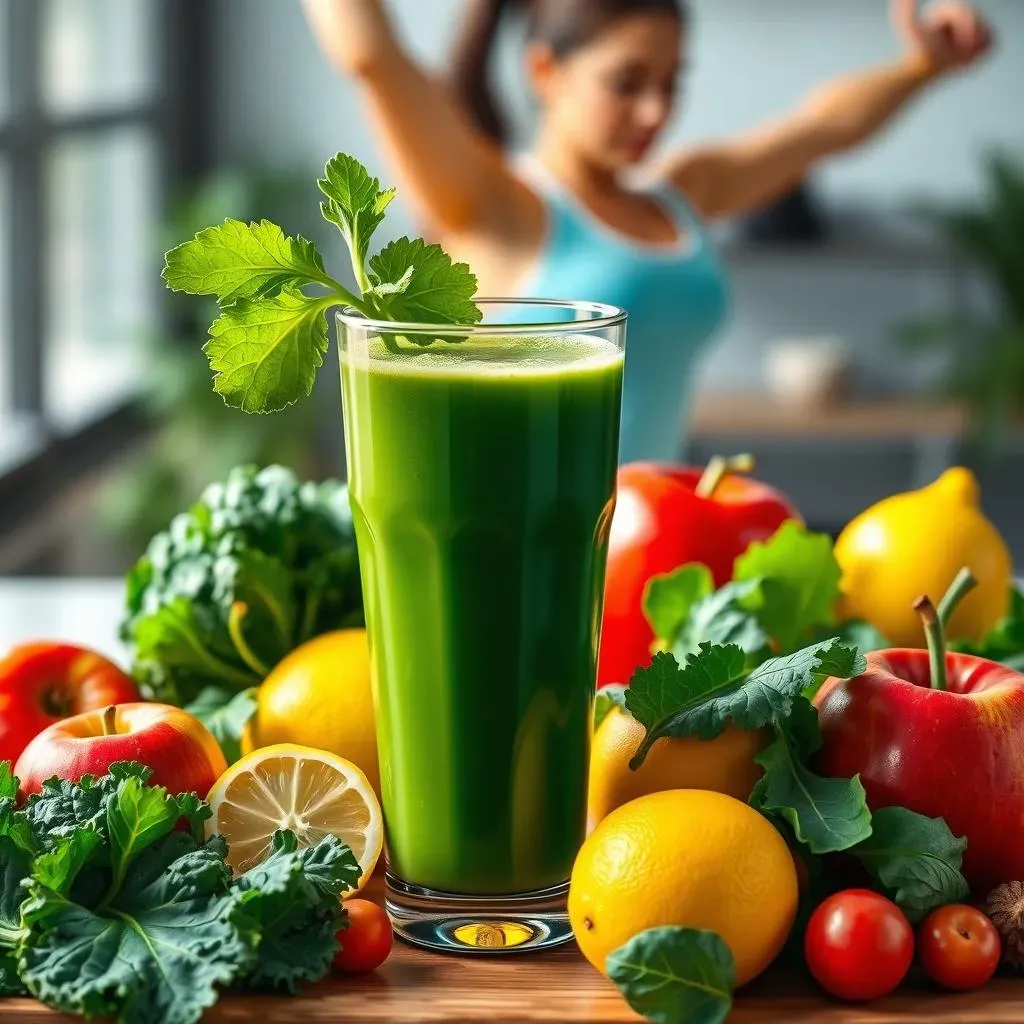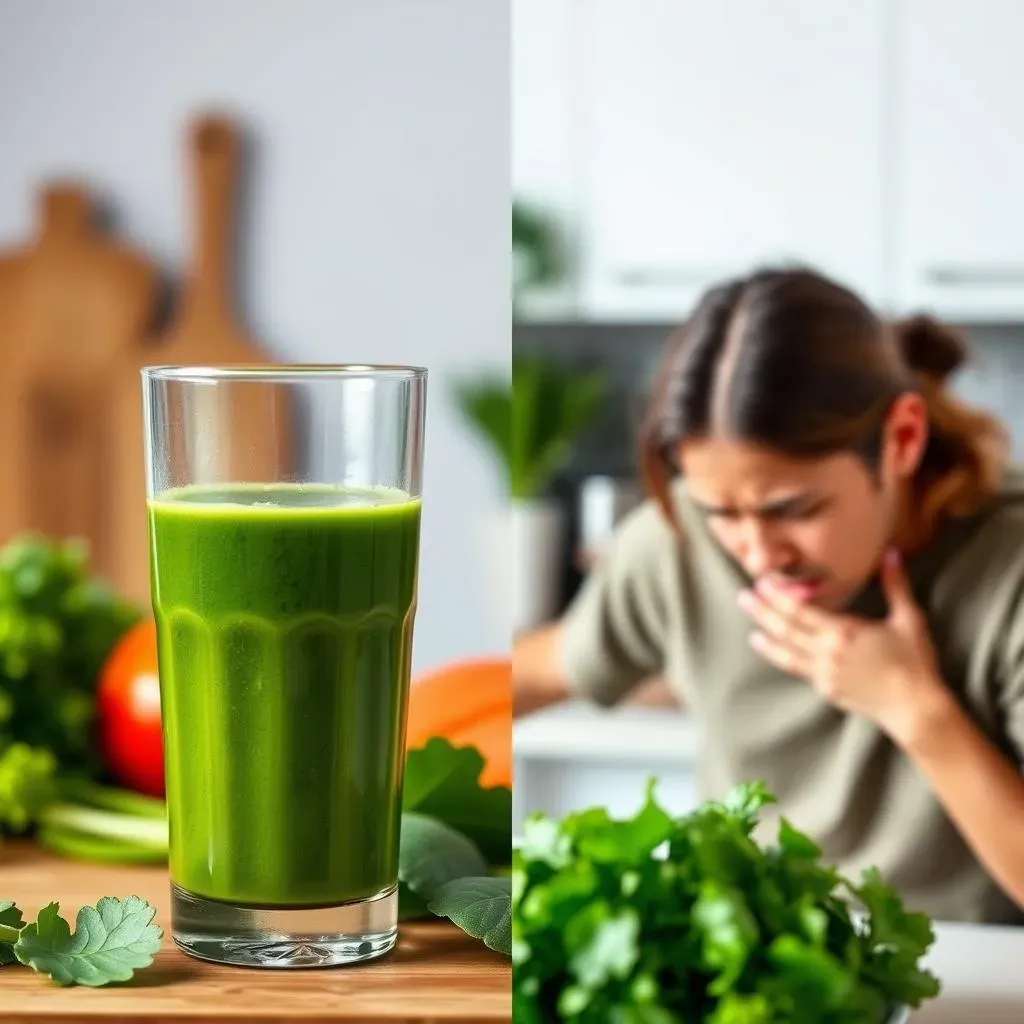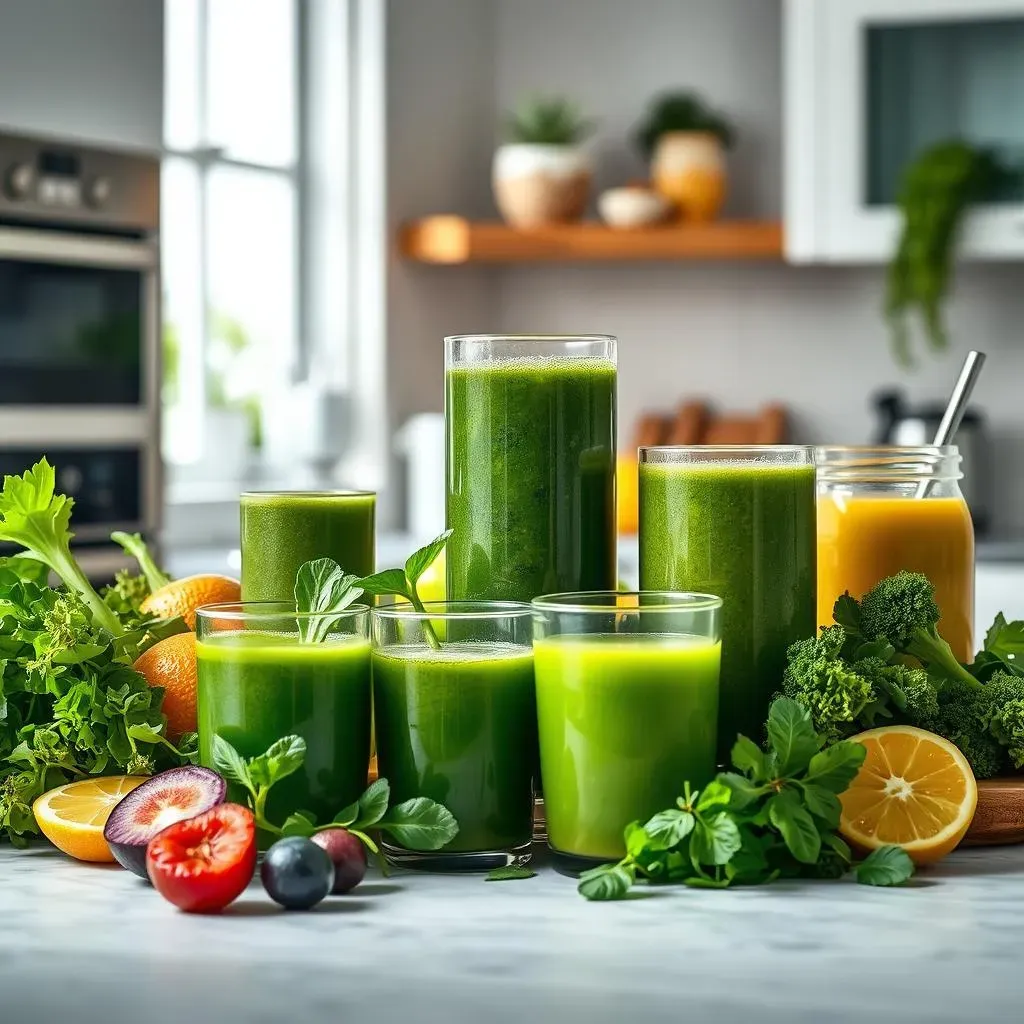Table of Contents
In a world obsessed with quick fixes and wellness trends, detox green juice has surged in popularity. But what does detox green juice do, really? Is it a magical elixir that cleanses your body and boosts your health, or just another overhyped fad? This article dives deep into the world of green juice to separate fact from fiction. We'll explore the potential benefits, from increased energy and reduced inflammation to improved digestion and glowing skin. But it's not all sunshine and kale; we'll also examine the potential downsides, including blood sugar spikes, kidney concerns, and the lack of essential fiber. You'll learn how to make your own delicious and nutritious green juice at home, and how to incorporate it into a balanced diet for optimal health. Finally, we'll compare green juice to whole fruits and vegetables to determine which is the better choice for long-term well-being. So, grab your blender and get ready to discover the truth about detox green juice!
What Does Detox Green Juice Do for Your Body? Unveiling the Benefits

What Does Detox Green Juice Do for Your Body? Unveiling the Benefits
Nutrient Powerhouse: Fueling Your Cells
Alright, so what's the big deal with green juice? Well, think of it as a concentrated shot of vitamins and minerals. When you blend up all those leafy greens, veggies, and maybe a little fruit, you're essentially creating a liquid multivitamin. We're talking vitamins A, C, and K, plus folate, potassium, and a whole host of phytonutrients – plant compounds with antioxidant and anti-inflammatory properties.
These nutrients play a crucial role in supporting various bodily functions. Vitamin C, for example, is essential for immune function and collagen production, while vitamin K is vital for blood clotting and bone health. The antioxidants in green juice help protect your cells from damage caused by free radicals, potentially reducing your risk of chronic diseases. It's like giving your body a super-charged tune-up from the inside out.
Hydration and Digestion: Aiding Your Body's Natural Processes
Beyond the vitamins and minerals, green juice is also incredibly hydrating. Since it's mostly water, it can help you meet your daily fluid needs, which is essential for everything from energy levels to kidney function. Plus, the liquid form makes it easier for your body to absorb the nutrients compared to eating a pile of raw vegetables.
Some people also find that green juice aids digestion. While it lacks the fiber of whole vegetables, the enzymes and phytonutrients can help stimulate digestive processes and reduce bloating. It's like giving your gut a gentle nudge in the right direction. However, if you're prone to digestive issues, it's always a good idea to start slow and see how your body reacts.
Benefit | Description |
|---|---|
Nutrient Boost | Provides a concentrated source of vitamins, minerals, and antioxidants. |
Hydration | Helps meet daily fluid needs. |
Digestion Aid | Enzymes and phytonutrients may stimulate digestive processes. |
The Potential Downsides: Risks and Side Effects of Detox Green Juice

The Potential Downsides: Risks and Side Effects of Detox Green Juice
Alright, let's talk about the flip side. While green juice can be a nutritional powerhouse, it's not without its potential drawbacks. One of the biggest concerns is the lack of fiber. When you juice fruits and vegetables, you're essentially removing the fiber, which is crucial for regulating blood sugar levels, promoting healthy digestion, and keeping you feeling full. Without fiber, the sugars in the juice can be absorbed more quickly, leading to a rapid spike in blood sugar, followed by a crash. This can be especially problematic for people with diabetes or insulin resistance.
Another potential issue is the oxalate content of some green vegetables, like spinach and kale. Oxalates are naturally occurring compounds that can bind to calcium in the body and form crystals. In some people, especially those with kidney problems, this can increase the risk of kidney stones. While you don't have to avoid these vegetables altogether, it's important to be mindful of your intake and drink plenty of water to help flush out the oxalates.
Also, it is worth noting that some people may experience digestive discomfort from drinking green juice, especially if they're not used to consuming large amounts of raw vegetables. This can manifest as bloating, gas, or diarrhea. To minimize these effects, start with small amounts of green juice and gradually increase your intake as your body adapts.
- Blood Sugar Spikes: Lack of fiber can cause rapid increases in blood sugar.
- Kidney Issues: High oxalate content in some greens may contribute to kidney stones.
- Digestive Discomfort: Raw vegetables can lead to bloating, gas, or diarrhea in some individuals.
Making the Most of Green Juice: Recipes and Consumption Tips

Making the Most of Green Juice: Recipes and Consumption Tips
so you're ready to dive into the world of green juice? Awesome! Let's talk about how to make the most of it. First off, forget those sugary, store-bought juices. The real magic happens when you DIY. Not only is it way cheaper, but you also have complete control over the ingredients. The basic formula is simple: start with a base of leafy greens like spinach, kale, or romaine lettuce. Then, add in some veggies like cucumber, celery, or carrots. For a touch of sweetness, toss in a green apple, a pear, or a bit of lemon or lime. Experiment with different combinations to find your perfect blend! For example, try blending spinach, cucumber, green apple, and ginger for a refreshing and slightly spicy juice. Or, go for a kale, celery, lemon, and parsley combo for a more intense, detoxifying blend. The possibilities are endless!
When it comes to consumption, timing is key. It's best to drink green juice on an empty stomach, either first thing in the morning or between meals. This allows your body to absorb the nutrients more efficiently. Start with a small serving (about 8 ounces) and see how you feel. If you're new to green juice, your body might need some time to adjust. Also, don't chug it down! Sip it slowly and savor the flavors. Think of it as a mindful ritual, a way to nourish your body and connect with the earth.
And remember, variety is the spice of life! Don't get stuck in a green juice rut. Rotate your greens and veggies to ensure you're getting a wide range of nutrients. Try adding in some herbs like cilantro or mint for extra flavor and health benefits. You can also boost the nutritional value of your juice with superfoods like spirulina, chlorella, or wheatgrass powder. Just be sure to start with small amounts, as these can have a strong taste.
- Start with a base of leafy greens: Spinach, kale, romaine lettuce.
- Add veggies for flavor and nutrients: Cucumber, celery, carrots.
- Sweeten naturally with fruit: Green apple, pear, lemon, lime.
- Drink on an empty stomach: Morning or between meals for better absorption.
- Sip slowly and savor: Make it a mindful ritual.
- Rotate your ingredients: Ensure a wide range of nutrients.
Detox Green Juice vs. Whole Foods: Which is Better for Overall Health?

Detox Green Juice vs. Whole Foods: Which is Better for Overall Health?
Fiber's the Key: Why Whole Foods Win
let's get real. While green juice offers a concentrated dose of nutrients, it's missing one crucial element: fiber. And fiber is a total game-changer when it comes to overall health. Whole fruits and vegetables are packed with both soluble and insoluble fiber, which play different but equally important roles in your body. Soluble fiber helps regulate blood sugar levels and lower cholesterol, while insoluble fiber promotes healthy digestion and keeps things moving through your system. When you juice, you're essentially throwing all that goodness away.
Think of it this way: eating an apple is like getting the whole package – the vitamins, minerals, antioxidants, and fiber all working together in synergy. Drinking apple juice is like getting a watered-down version with all the fiber stripped out. Sure, you're still getting some nutrients, but you're missing out on a huge part of the benefits. Plus, the fiber in whole foods helps you feel fuller for longer, which can aid in weight management.
Nutrient Density vs. Convenience: Weighing the Options
Now, I'm not saying green juice is completely useless. It can be a convenient way to boost your nutrient intake, especially if you struggle to eat enough fruits and vegetables. But it's important to remember that it's not a substitute for whole foods. Whole foods offer a wider range of nutrients and phytonutrients, as well as fiber, which you simply can't get from juicing. It's always better to prioritize whole foods whenever possible.
Consider this: you'd have to juice a whole lot of spinach to get the same amount of iron as you would from eating a cup of cooked spinach. Plus, when you eat the whole spinach, you're also getting the fiber and other beneficial compounds that are lost during juicing. So, while green juice can be a helpful addition to your diet, it shouldn't be your primary source of nutrients.
Feature | Green Juice | Whole Foods |
|---|---|---|
Fiber | Low to None | High |
Nutrient Density | Concentrated | Varied |
Convenience | High | Moderate |
Making Informed Choices: A Balanced Approach
Ultimately, the best approach is to find a balance that works for you. If you enjoy green juice and find that it helps you consume more vegetables, then go for it! Just be sure to prioritize whole foods in your diet as well. Aim to fill your plate with a colorful variety of fruits, vegetables, whole grains, and lean protein. Think of green juice as a supplement, not a replacement, for a healthy diet.
Also, be mindful of the ingredients you're using in your green juice. Opt for organic produce whenever possible to minimize your exposure to pesticides. And be careful not to overdo it on the fruit, as this can significantly increase the sugar content of your juice. The key is to listen to your body and make choices that support your overall health and well-being. After all, a healthy lifestyle is a marathon, not a sprint. And a little green juice can be a part of that journey, as long as you keep it in perspective.
The Final Sip: Is Detox Green Juice Right for You?
So, what does detox green juice do? It can be a convenient way to boost your nutrient intake, potentially offering benefits like increased energy and reduced inflammation. However, it's crucial to remember that green juice is not a magic bullet. It lacks the fiber of whole fruits and vegetables and can have potential downsides if consumed excessively. The key is moderation and balance. Incorporate green juice as part of a healthy lifestyle that includes a varied diet, regular exercise, and plenty of water. And always listen to your body – if you experience any adverse effects, discontinue use and consult with a healthcare professional. Ultimately, the best approach to health is a holistic one, where green juice is just one small, vibrant component.